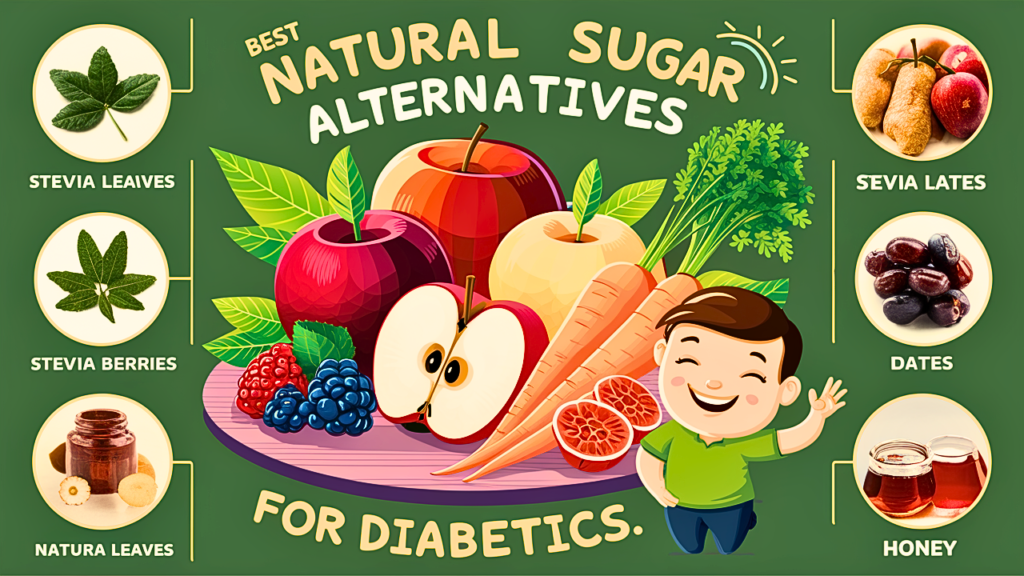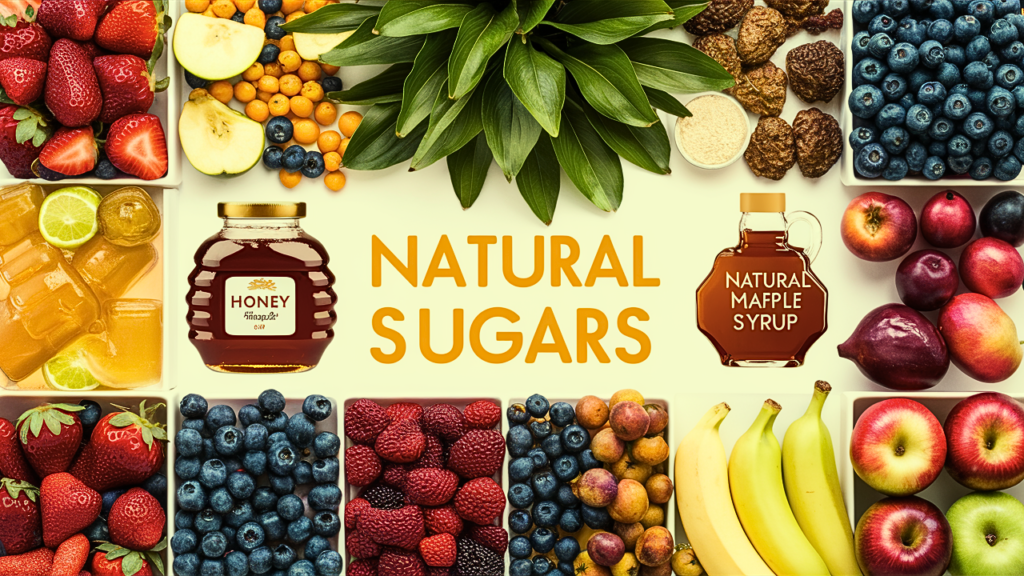Best Natural Sugar Alternatives For Diabetics : Sweetening Life with Diabetes, A Sweet Solution to Managing Blood Sugar Levels.
Living with diabetes doesn’t mean giving up on sweetness altogether. The key lies in finding healthy alternatives that satisfy your cravings without spiking your blood sugar levels. This article explores a range of best natural sugar alternatives for diabetics specifically suited for, guiding you towards a tastier and healthier diabetic lifestyle.

Image : Best natural sugar alternatives for diabetics
Table of Contents
Understanding Blood Sugar and Sweeteners
Before diving into specific options, let’s establish some ground rules. Regular table sugar, chemically known as sucrose, raises blood sugar levels rapidly. This triggers the release of insulin, a hormone that helps cells absorb glucose (sugar) from the bloodstream for energy. In diabetics, however, insulin production or sensitivity may be impaired, leading to high blood sugar levels and potential health complications.
Natural sugar alternatives, on the other hand, offer various benefits:
- Minimal impact on blood sugar: These sweeteners either have a negligible effect on blood sugar or are not absorbed by the body at all.
- Reduced calorie intake: Many natural alternatives are significantly lower in calories compared to sugar.
- Potential health benefits: Some options boast additional nutrients or antioxidant properties.
Natural Sugar Alternatives for Weight Loss
In today’s health-conscious world, reducing sugar intake has become a priority for many individuals aiming to achieve weight loss and overall wellness. The detrimental effects of excessive sugar consumption on weight management and health are widely acknowledged, prompting a search for healthier alternatives. Fortunately, nature provides an array of sweeteners that offer sweetness without the drawbacks of refined sugar. Let’s explore some natural sugar alternatives that can aid in weight loss while satisfying your sweet tooth.
Related : 10th Best Way To Weight Lose Naturally
Criteria for Choosing Best Natural Sugar Alternatives For Diabetics
When selecting best natural sugar alternatives for diabetics, several factors should be considered. One essential criterion is the glycemic index (GI), which measures how quickly a carbohydrate-containing food raises blood glucose levels. Low-GI foods are preferable for diabetics as they cause slower and steadier increases in blood sugar. Additionally, natural sugar alternatives often contain beneficial nutrients and antioxidants, making them healthier choices compared to refined sugars.
Best Natural Sugar Alternatives For Diabetics
- Stevia: Stevia is the best natural sugar alternatives for diabetics on choice. This superstar sweetener reigns supreme for its zero-calorie, zero-carbohydrate content. Extracted from the leaves of the Stevia rebaudiana plant, stevia is intensely sweet (often 200-300 times sweeter than sugar) and doesn’t raise blood sugar levels. However, stevia can have a slightly bitter aftertaste, so it’s often blended with other sweeteners.
- Monk Fruit Extract: This natural sweetener comes from the Siraitia grosvenorii fruit, native to Southeast Asia. Monk fruit extract is another zero-calorie, zero-carb option with a sweetness level exceeding sugar’s. It boasts a clean, slightly sweet taste without the bitterness of stevia.
- Erythritol: This sugar alcohol is naturally present in some fruits and fermented foods. Erythritol is absorbed by the body but not metabolized, meaning it doesn’t raise blood sugar or contribute to calories. It has a sweetness level around 70% that of sugar and a pleasant taste.
- Allulose: This rare sugar is found in small amounts in fruits like figs and raisins. Allulose is partially absorbed by the body and has a minimal effect on blood sugar. It possesses about 70% of the sweetness of sugar and a versatile taste profile.
- Sugar Alcohols (Xylitol, Maltitol): Sugar alcohols like xylitol and maltitol are processed differently than sugar, leading to a slower rise in blood sugar. While generally considered safe for diabetics in moderation, excessive consumption can cause digestive discomfort. These sugar alcohols have a sweetness level close to sugar and a cooling effect on the tongue.

Natural Sweeteners with a Glycemic Index Twist
Some natural sweeteners, while not calorie-free, boast a lower glycemic index (GI) compared to sugar. The GI measures how quickly a food raises blood sugar levels. Here are two options to consider:
- Yacon Syrup: Derived from the yacon plant’s root, yacon syrup contains a prebiotic fiber called fructooligosaccharides (FOS). FOS is slowly digested and doesn’t significantly impact blood sugar. Yacon syrup has a rich, molasses-like sweetness and can be used in moderation.
- Coconut Sugar: Made from the sap of coconut palms, coconut sugar has a slightly lower GI than regular sugar. It also contains small amounts of minerals like potassium, magnesium, and iron. However, coconut sugar still contains calories and carbohydrates, so portion control is crucial.
Beyond Sweeteners: Embracing Natural Sweetness
Remember, there’s a whole world of naturally sweet flavors waiting to be explored! Here are some tips for reducing your reliance on sweeteners altogether:
- Embrace the power of spices: Cinnamon, nutmeg, and even a hint of chili powder can enhance the sweetness perception in dishes.
- Ripe fruits: Nature’s candy! Opt for fruits in season, like berries or melons, for a burst of natural sweetness.
- Sweet vegetables: Roasted sweet potatoes or carrots add a touch of sweetness to savory dishes.
Choosing the best natural sugar alternatives for diabetics
The ideal natural sugar alternative depends on your individual preferences and needs. Consider these factors:
- Taste: Experiment with different options to find one you enjoy.
- Cooking Applications: Some sweeteners, like stevia, may lose sweetness when heated, while others like allulose are heat-stable.
- Digestive Tolerance: Sugar alcohols may cause bloating or gas in some individuals. Start with a small amount and monitor your body’s response.
Remember:
- Consult your doctor before making significant changes to your diet.
Also read : The Best Nutritional Powerhouse on 2024
Health Benefits of Each Sugar Alternative
Each natural sugar alternative offers unique health benefits beyond its sweetness. Stevia, for example, has been studied for its potential to lower blood pressure and blood sugar levels. Monk fruit may have anti-inflammatory properties, while erythritol is known for its tooth-friendly nature, as it doesn’t contribute to tooth decay.
How to Use Natural Sugar Alternatives in Cooking and Baking
Using natural sugar alternatives in cooking and baking requires some adjustments due to differences in sweetness and texture. It’s essential to follow recipes specifically designed for these sweeteners or experiment with small amounts to achieve the desired taste.

Tips for Managing Blood Sugar Levels
In addition to incorporating natural sugar alternatives, managing blood sugar levels involves adopting a healthy lifestyle. This includes regular physical activity, portion control, and monitoring carbohydrate intake. Working with a healthcare professional or registered dietitian can provide personalized guidance for diabetes management.
Common Misconceptions about Sugar Alternatives for Diabetics
There are several misconceptions surrounding sugar alternatives for diabetics, such as the belief that they are calorie-free or can be consumed in unlimited quantities. It’s important to understand that while natural alternatives may offer health benefits, they should still be used in moderation as part of a balanced diet.
Potential Risks and Precautions
While natural sugar alternatives are generally considered safe for most people, there are some precautions to be aware of. Some individuals may experience digestive issues with certain sugar alcohols, while others may be allergic to ingredients like stevia or monk fruit. It’s advisable to start with small amounts and monitor for any adverse reactions.
Recipes and Ideas for Using Natural Sugar Alternatives
From beverages to baked goods, there are countless ways to incorporate natural sugar alternatives into your diet. Try adding stevia to your morning coffee, using monk fruit sweetener in homemade sauces, or baking with erythritol for guilt-free treats.
Conclusion
In conclusion, natural sugar alternatives provide a sweet solution for diabetics looking to manage their blood sugar levels without sacrificing taste. From stevia to yacon syrup, there are plenty of options to suit every palate and dietary preference. By making thoughtful choices and incorporating these alternatives into your meals and snacks, you can enjoy delicious treats while supporting your overall health and well-being.
Unique FAQs
- Can I use natural sugar alternatives if I have diabetes?
- Yes, natural sugar alternatives can be a suitable option for individuals with diabetes as they generally have a lower impact on blood sugar levels compared to refined sugars.
- Are there any side effects of using natural sugar alternatives?
- While rare, some people may experience digestive issues such as bloating or diarrhea when consuming certain sugar alcohols like erythritol or xylitol.
- How do I know which sugar alternative is best for me?
- It’s essential to consider factors such as taste preference, health goals, and any dietary restrictions when choosing a sugar alternative. Experimenting with small amounts can help you determine which option works best for you.
- Can natural sugar alternatives be used in baking?
- Yes, many natural sugar alternatives can be used in baking as substitutes for traditional sugars. However, it may require some adjustments to the recipe to achieve the desired taste and texture.
- Is it safe to consume natural sugar alternatives during pregnancy?
- While natural sugar alternatives are generally considered safe for pregnant women, it’s advisable to consult with a healthcare professional before making any significant dietary changes.
